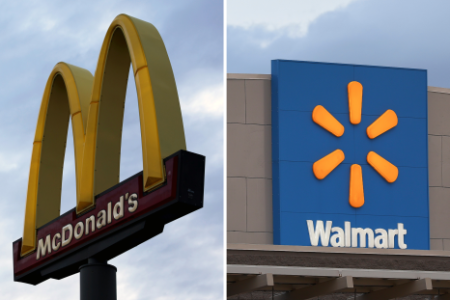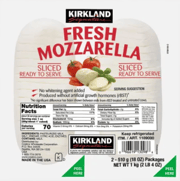A nationwide economic blackout is set for August 9—here’s what the boycott is about
- Replies 2
Mark your calendars, readers—August 9 is shaping up to be a day unlike any other for American wallets.
If you’ve heard whispers about a “nationwide economic blackout,” you’re not alone.
The buzz is real, and it’s got folks from coast to coast asking: What’s this all about? Should I join in? And, most importantly, will it make a difference?
On August 9, a grassroots advocacy group called The People’s Union USA is calling for Americans to put their wallets on lockdown.
The idea? Don’t spend a dime—unless it’s absolutely necessary. No online shopping, no streaming, no fast food, no big-box store runs.
If you must buy, the group urges you to support small, local businesses instead of the corporate giants.

This isn’t just about skipping your morning coffee run or holding off on that Amazon order.
The organizers are encouraging people to take it a step further: organize peaceful protests, take the day off work, or even close your own business in solidarity.
The message is clear—August 9 is a day to hit pause on business as usual and send a message to corporate America.
The People’s Union USA, led by activist John Schwarz, is the driving force behind this movement. They describe themselves as a nonpartisan, grassroots group fighting for “economic resistance, corporate accountability, and real justice for the working class.”
Their mission? To push back against what they see as unchecked corporate greed, price gouging, tax avoidance, and the mistreatment of workers.
This isn’t their first rodeo. The group has previously organized boycotts targeting major brands like Target, McDonald’s, Walmart, and Lowe’s.
Their “Economic Blackout Tour” has been rolling across the country, with similar events in April and a summer-long boycott of select retailers.
But this time, Schwarz says, the blackout is about more than just dollars and cents. It’s a way for everyday Americans to express their frustration with a system that, in their view, too often puts profits over people.
Also read: Retailers scramble to keep prices steady amid tariff pressure: Are shoppers the ones who pay?
Here’s where things get interesting. Can a one-day spending freeze really rattle the corporate giants? Experts are divided.
On one hand, history shows that consumer boycotts can make waves—especially when they’re part of a larger movement.
Think of the Montgomery Bus Boycott during the Civil Rights era or more recent campaigns that have forced companies to rethink their policies.
When enough people act together, companies do take notice—if not in their bottom line, then certainly in their public image.
Also read: Tariff trouble? Why a growing boycott from Canada could cost American tourism $6 billion
On the other hand, some economists argue that unless these actions are paired with legal or regulatory changes, their impact is often short-lived.
As political economist Michelle Meagher puts it, “I don’t think consumer boycotts alone work unless complemented by regulatory or legal action by the government.”
Still, even if the financial hit is temporary, the message can be powerful. As The People’s Union USA puts it: “Money is the only language the system understands. We don’t need to riot or protest in the streets to be heard. All we have to do is stop feeding them. When we pull our dollars, we pull their power. Economic resistance is nonviolent, it's powerful, and it's the one tool they cannot silence."
The People’s Union USA has more boycotts planned in the months ahead. September actions are reportedly set to target Amazon, Uber, and Pepsi.
Read next: Economists reveal: Is the US on the brink of a recession? See if finances are at risk


Are you planning to participate in the August 9 economic blackout? Do you think these kinds of protests make a difference, or are they just a drop in the bucket? Have you ever taken part in a boycott before—and did it change your habits?
If you’ve heard whispers about a “nationwide economic blackout,” you’re not alone.
The buzz is real, and it’s got folks from coast to coast asking: What’s this all about? Should I join in? And, most importantly, will it make a difference?
On August 9, a grassroots advocacy group called The People’s Union USA is calling for Americans to put their wallets on lockdown.
The idea? Don’t spend a dime—unless it’s absolutely necessary. No online shopping, no streaming, no fast food, no big-box store runs.
If you must buy, the group urges you to support small, local businesses instead of the corporate giants.

The goal is to temporarily cut financial support to major corporations accused of unfair practices. Image source: Getty Images / Newsweek
This isn’t just about skipping your morning coffee run or holding off on that Amazon order.
The organizers are encouraging people to take it a step further: organize peaceful protests, take the day off work, or even close your own business in solidarity.
The message is clear—August 9 is a day to hit pause on business as usual and send a message to corporate America.
The People’s Union USA, led by activist John Schwarz, is the driving force behind this movement. They describe themselves as a nonpartisan, grassroots group fighting for “economic resistance, corporate accountability, and real justice for the working class.”
Their mission? To push back against what they see as unchecked corporate greed, price gouging, tax avoidance, and the mistreatment of workers.
This isn’t their first rodeo. The group has previously organized boycotts targeting major brands like Target, McDonald’s, Walmart, and Lowe’s.
Their “Economic Blackout Tour” has been rolling across the country, with similar events in April and a summer-long boycott of select retailers.
But this time, Schwarz says, the blackout is about more than just dollars and cents. It’s a way for everyday Americans to express their frustration with a system that, in their view, too often puts profits over people.
Also read: Retailers scramble to keep prices steady amid tariff pressure: Are shoppers the ones who pay?
Here’s where things get interesting. Can a one-day spending freeze really rattle the corporate giants? Experts are divided.
On one hand, history shows that consumer boycotts can make waves—especially when they’re part of a larger movement.
Think of the Montgomery Bus Boycott during the Civil Rights era or more recent campaigns that have forced companies to rethink their policies.
When enough people act together, companies do take notice—if not in their bottom line, then certainly in their public image.
Also read: Tariff trouble? Why a growing boycott from Canada could cost American tourism $6 billion
On the other hand, some economists argue that unless these actions are paired with legal or regulatory changes, their impact is often short-lived.
As political economist Michelle Meagher puts it, “I don’t think consumer boycotts alone work unless complemented by regulatory or legal action by the government.”
Still, even if the financial hit is temporary, the message can be powerful. As The People’s Union USA puts it: “Money is the only language the system understands. We don’t need to riot or protest in the streets to be heard. All we have to do is stop feeding them. When we pull our dollars, we pull their power. Economic resistance is nonviolent, it's powerful, and it's the one tool they cannot silence."
The People’s Union USA has more boycotts planned in the months ahead. September actions are reportedly set to target Amazon, Uber, and Pepsi.
Read next: Economists reveal: Is the US on the brink of a recession? See if finances are at risk
Key Takeaways
- A nationwide economic blackout has been called for August 9 by The People’s Union USA, urging Aussies to avoid all non-essential spending as a protest against corporate practices.
- The boycott is aimed at major corporations accused of price gouging, tax avoidance, and poor treatment of workers, with shoppers encouraged to support only small, local businesses if necessary.
- Similar boycotts and “economic blackouts” organized by The People’s Union USA in the past have targeted brands like Target, McDonald’s, and Walmart, focusing on issues like reducing diversity and equity commitments.
- Experts say that while such campaigns may not drastically change corporate behavior, they can impact company reputations and highlight growing public frustration with corporate greed and inequality.
Key Takeaways
Are you planning to participate in the August 9 economic blackout? Do you think these kinds of protests make a difference, or are they just a drop in the bucket? Have you ever taken part in a boycott before—and did it change your habits?






